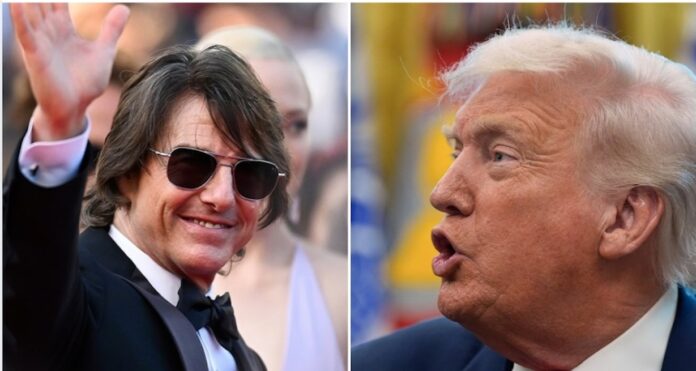- Tom Cruise turned down a Kennedy Center Lifetime Achievement Award from President Trump, officially citing “scheduling conflicts.”
- Trump personally announced the honorees, breaking tradition. He selected stars like Sylvester Stallone, KISS, Michael Crawford, Gloria Gaynor, and George Strait.
- The decision fueled public debate over politics in cultural awards. It also highlighted the president’s shift away from honoring jazz, dance, and classical music.
Hollywood megastar Tom Cruise has quietly turned down one of America’s highest cultural honors. The decision is stirring up more conversation than the award itself.
According to insiders at the Kennedy Center, the 63-year-old Mission: Impossible actor was personally selected by President Donald Trump. He was to receive a Lifetime Achievement Award this year. Yet when the offer came, Cruise reportedly passed, officially blaming “scheduling conflicts.” Behind closed doors, however, whispers suggest his choice might have been about more than a busy calendar.
The Washington Post broke the news, citing unnamed Kennedy Center staff. They claimed Trump had been “very involved” in hand-picking the honorees. While most recipients quickly accepted, Cruise’s polite but firm “no” left the president’s team scrambling for a replacement.
A Star Who Avoids Politics
Cruise, a long-time member of the Church of Scientology, has famously avoided political entanglements throughout his career. Other actors have been outspoken in their views, but he has preferred to focus on blockbuster films, global promotions, and causes close to his heart — particularly supporting military personnel, veterans, and humanitarian missions.
Even so, the offer placed him in an unusual position. Accepting would mean standing alongside President Trump on a stage. This comes at a time when celebrity politics remain a divisive subject in America. Declining would raise eyebrows and inevitably spark speculation.
In the end, Cruise kept his explanation simple: his schedule simply didn’t allow for the appearance. Whether audiences believe that is another matter.
Trump Takes the Spotlight
Traditionally, the Kennedy Center announces honorees through a formal press release. The focus is usually on the artists’ contributions to American culture. This year was different. Standing in the Kennedy Center’s Hall of Nations, Trump personally unveiled the names in a televised moment heavy with showmanship.
The chosen group included Sylvester Stallone, rock legends KISS, Broadway icon Michael Crawford, disco queen Gloria Gaynor, and country superstar George Strait. Trump called them “the best of the best,” lavishing personal praise on each.
His words for Stallone were especially glowing. Calling the Rocky and Rambo star “one of the greatest actors of his generation,” Trump reminisced about being a young man watching Rambo in theaters. “I said, ‘This movie is phenomenal. What the heck.’ Nobody else could have done what he did,” the president declared.
For Crawford, Trump hailed his turn in The Phantom of the Opera as “one of the greatest roles in Broadway history.” Speaking of Gloria Gaynor, he called her disco anthem I Will Survive “unbelievable.” He claimed it only gets better every time it’s played.
George Strait’s decades of country hits were met with applause. Trump closed the event with a half-joking remark: “Next year we’ll honor Trump, okay?”
Breaking with Tradition
One notable change this year — and one that didn’t go unnoticed — was the absence of honorees from jazz, dance, or classical music. For decades, those art forms have been staples of the Kennedy Center’s recognition. Some cultural critics have accused the president of reshaping the awards into a more populist, entertainment-focused event. This has left certain artistic communities feeling sidelined.
That shift is not accidental. Since beginning his second term, Trump has taken direct control of the Kennedy Center. He named himself chairman and appointed fourteen new board members. He has also used his platform to take swipes at other award shows, particularly the Academy Awards, which he called “woke” and “boring.”
“Look at the Academy Awards,” he told the crowd. “It gets lousy ratings. Now it’s all woke. All they do is talk about how much they hate Trump — but nobody likes that.”
Public Reaction Divided
News of Cruise’s decision spread quickly. Fans and commentators were split on whether it was a smart move or a missed opportunity. Supporters praised him for avoiding a political spotlight. They said the actor’s brand has always been about escapism, not partisan drama. “Tom’s smart enough to know you can’t win with politics these days,” one fan wrote online. “He’s better off making movies.”
Others saw it differently, accusing Cruise of turning down a chance to honor the arts simply because of personal disagreements. On social media, Trump supporters were quick to suggest the actor “couldn’t put his ego aside” or “didn’t want to be on stage with a real leader.”
Some in Hollywood quietly admitted they understood his decision. One industry insider told Variety: “If you show up, you’re endorsing the person giving the award — whether you mean to or not. That’s a tough line to walk.”
Trump’s Celebrity Circle
Trump has long courted Hollywood names, both during his time as a businessman and now as president. Stallone, a known supporter, has appeared at Trump events before. KISS members Gene Simmons and Paul Stanley have also had cordial ties with the president, even if they’ve avoided full-throated political endorsements.
By contrast, Cruise’s refusal stands out. Though the actor has performed for military audiences and met presidents in the past, he has carefully avoided being linked too closely to any administration.




